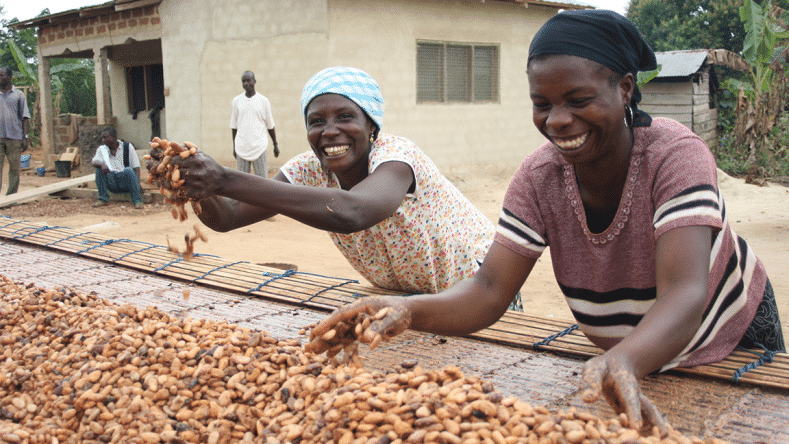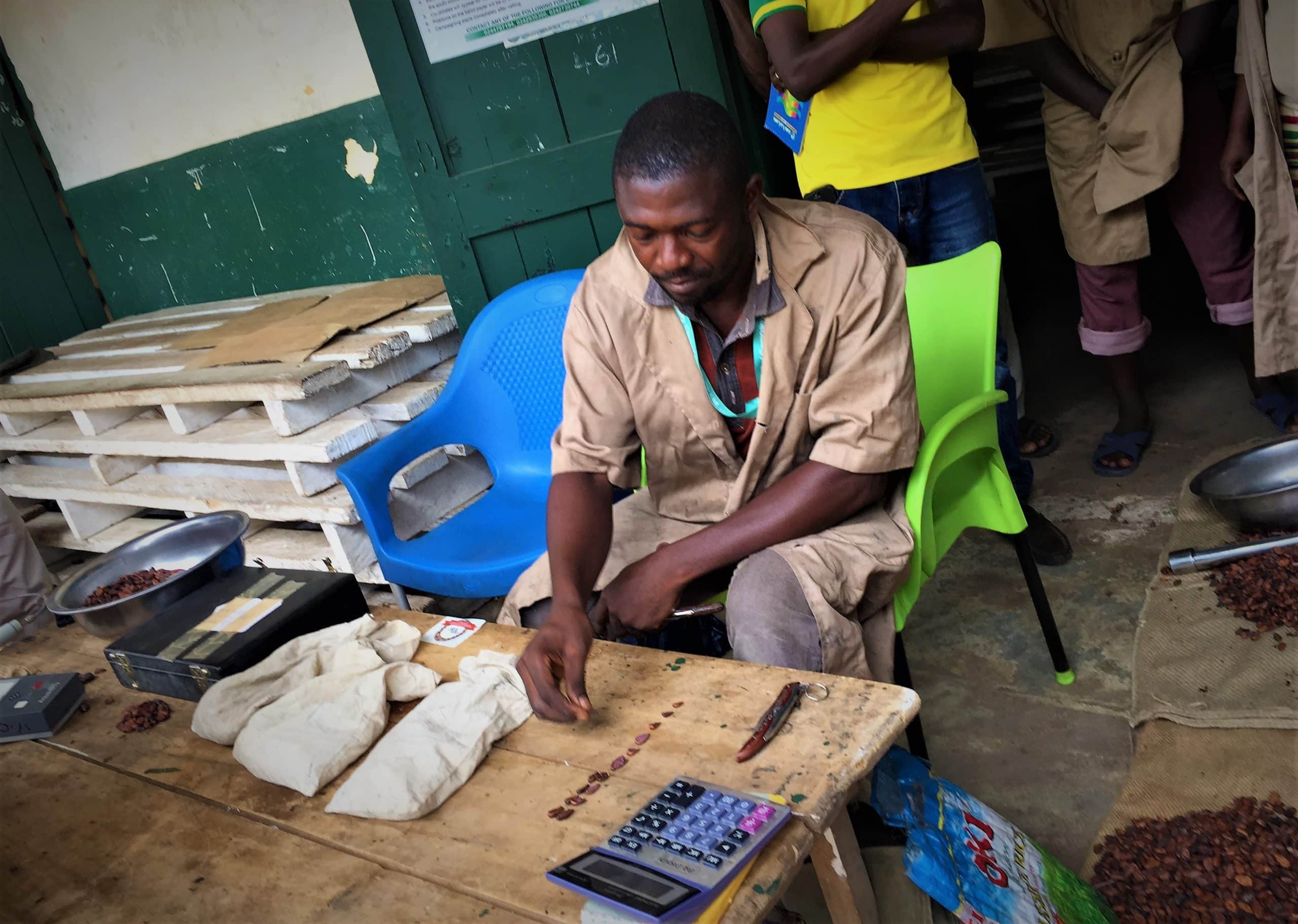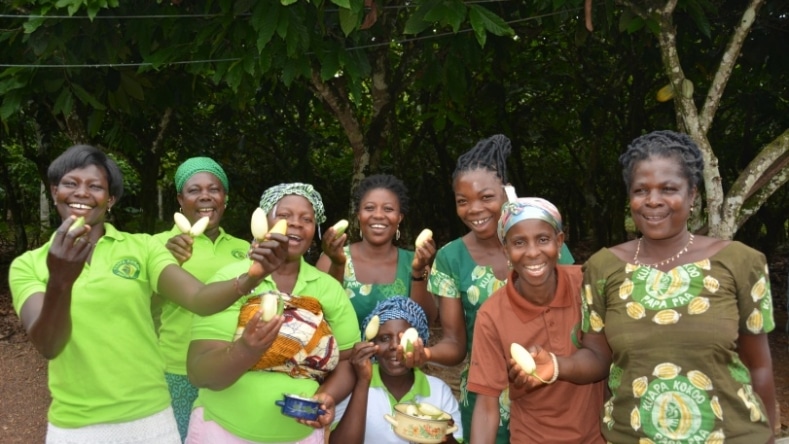
One of the country’s largest exports, cocoa employs approximately 800,000 farming families across Ghana. “It’s the biggest vocation, the biggest source of livelihood in these communities,” says Nelson Adubofour, head of the Kuapa Kokoo Farmers’ Union. “Cocoa farming dominates.”
However, not all of these families can reap the full rewards of their hard work. Many cocoa farmers in Ghana earn low incomes and struggle to access decent education or medical care. Some lack potable water. Climate change makes their job even harder, with weather patterns becoming more difficult to predict.
A Better Life for Farmers

In an industry dominated by foreign traders, Kuapa Kokoo stands out. In 1993, a group of 2,000 farmers joined forces with local nongovernmental organizations and an alternative trading organization, Twin Trading, to found a business that could connect Ghanaian farmers with international markets.
Since then, the business has grown into a farmers’ union of more than 100,000 cocoa growers—nearly half of whom are women—and a licensed buying company that works with the Ghanaian national cocoa board (COCOBOD) to export those farmers’ harvest internationally. These farmers also co-own Divine Chocolate, a chocolate company whose bars are made entirely from cocoa they’ve grown.
“We are one of the largest indigenous cocoa buying companies in Ghana,” says Samuel. “We seek prosperity, growth, and profitability of the company… that will benefit its members. These members are the 100,000 farmers that we serve.”
Kuapa Kokoo’s leaders understand that, in order to protect their supply chain, they need to invest in the wellbeing of their farmers. From the beginning, the business has committed to fair labor practices—a commitment that earned them Fair Trade and UTZ certifications.
But Kuapa Kokoo doesn’t stop there. The business uses the premium prices earned from those certifications to invest in projects that benefit entire communities. One of these projects is an income diversification program that trains farmers—primarily women—to grow yams, cassava, and other crops that supplement their incomes during the “lean months” between cocoa harvests. The business also helps pay for its farmers’ healthcare, and has launched a mobile clinic outreach system that brings medical services to hard-to-reach farming communities.
Leveraging Mobile Technology

In order to boost farmers’ yields and ensure compliance with their various certifications, Kuapa Kokoo has hired dozens of agricultural extension workers to offer training to farmers. However, they still found it difficult to reach all 100,000 farmers with this vital resource.
To fill this gap, Kuapa Kokoo partnered with the Millennium Promise Alliance and local telephone company AirtelTigo to construct a “Tele-Agric” center that offers technical assistance to farmers over the phone. They staffed the center with mobile extension workers fluent in the farmers’ native languages, and developed a plan to distribute smartphones to farmer-members to ensure they can access these services.
“We’re leveraging ICT (information and communication technology) to deliver first-class agricultural extension services to farmers—wherever they are.”Nelson Adubofour, head of Kuapa Kokoo Farmers’ Union
In partnership with the Mastercard Foundation, Root Capital offered Kuapa Kokoo a grant of $20,000 to purchase their first 250 phones for the Tele-Agric center. Now, farmers who have a question or encounter a problem can call the extension workers at the center and resolve the issue over the phone, instead of waiting for a fieldworker to visit them in person.
Investing in Kuapa Kokoo’s Success
 Members of Margret’s women’s group showing off their crop of aubergines from the communal farm.
Members of Margret’s women’s group showing off their crop of aubergines from the communal farm.
While the business has other financiers, due to the massive volume of cocoa it purchases Kuapa Kokoo sometimes has trouble meeting its credit needs during the harvest. Thanks to the vast array of services that the cooperative offers its members, farmers trust Kuapa Kokoo enough to sell their crops on credit. However, those farmers would much prefer to be paid in cash at the time of the harvest.
To address this issue, since 2013 we’ve extended a cumulative $4.5 million in financing to the business. We’ve also supported Kuapa Kokoo with training that built their team’s capacity to manage large and complex loans. As Kuapa Kokoo has expanded its services to meet the evolving needs of their farmer-members, Root Capital’s support has helped them implement those services effectively while still paying farmers fairly and on time.
Photos © Root Capital, Divine Chocolate, and Kuapa Kokoo. Cover photo features Sarah Ayipah and Esi Konadu, cocoa farmers and members of Kuapa Kokoo. Information in this client profile is up-to-date as of publishing time.